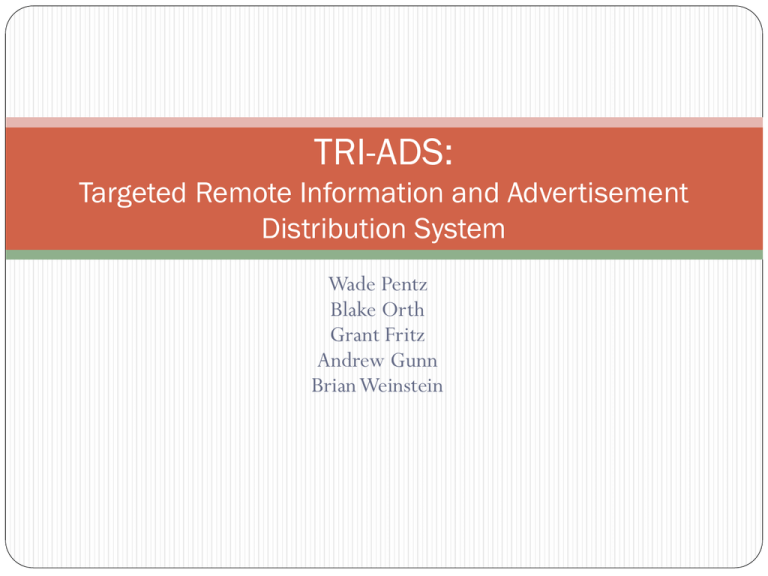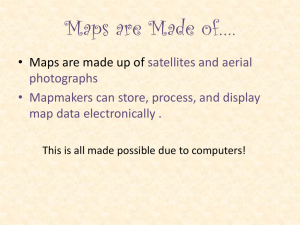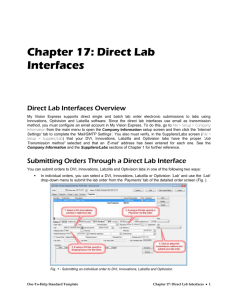Total
advertisement

TRI-ADS: Targeted Remote Information and Advertisement Distribution System Wade Pentz Blake Orth Grant Fritz Andrew Gunn Brian Weinstein System Overview Network of targeted advertisement display modules Change display based on location, time of day, weather, emergency status, etc Provide standard DVI output Modules communicate wirelessly with a base station Powered from 12V DC wall adapter or car outlet Wade Pentz System Overview Wade Pentz Primary Secondary Tertiary • GPS data processing • LCD display • GPS based image change •WiFi communication • Base station •Universal power board •Second module • Analog sensors • Bluetooth • Base station GUI • Packaging • Animation Level 0 Functional Decomposition Wade Pentz Level 1Hardware Functional Decomposition Wade Pentz Command and Data Handling System Overview Coordinate DVI output with CPLD and load image off of SD card Store GPS location and coordinate ad changes Manage Wifi/3G link and remote update Manage Bluetooth communications between display modules Gather temperature/accelerometer data and coordinate ad changes Grant Fritz CDH Functional Decomposition Grant Fritz Command and Data Handling System Hardware Using NGW-100 as main board AT32AP7000 microprocessor 2.6 Linux Kernel Resource Management Modular process software design Utilize standard libraries Grant Fritz Software Functional Diagram Grant Fritz CDH Software Functional Decomposition Level 0 Module Inputs Outputs Functionality Test Procedure Grant Fritz RunBabyRun (Level 0) - Raw GPS data - Inter-module Bluetooth data - Configuration data - Monitor display data - Inter-module Bluetooth data - Status data This process is the primary control and data processor for the TRI-AD system. It takes in raw GPS data through serial, processes it to understand its current location. Receives raw analog sensor data through the I2C bus. Receives update information and status requests through Inter-Process Communication. Negotiates display information with the CPLD through the SPI bus and coordinates with the DVI Chip through the I2C bus. Finally this module also does the primary logic of the system where which image is selected to be displayed. Level 1 Software Decomposition Grant Fritz CDH SFT Functional Decomposition Level 1 Logic Module Inputs Outputs Functionality CParse Logic (Level 1) - GPS Coordinates - Temperature - Time - Configuration Data Matrix - Image name to Display This takes in GPS coordinates, temperature, and time and determines which image from the configuration data to display. Test Procedure GPS (Level 1) - Raw Serial GPS Data - GPS Coordinates Takes in raw serial data, parses the serial char string and writes the data to variables. Test Procedure Functionality Test Procedure Module Inputs Outputs Functionality Inter-Process Communication Receive (Level 1) - IPC Messages - Control Takes in IPC Messages from a message queue and processes the message with the given command. The commands will consist of PING, SETIMAGE, CLEARIMAGE, HEALTH&STATUS, UPDATECONFIG, and SLEEP. Test Procedure Analog Sensors Display Module Inputs Outputs CParse (Level 1) - Configuration File name - Configuration Data Matrix Takes in the configuration file address and then parses the data into a data matrix for easy reference. Inter-Process Communication Receive GPS Module Inputs Outputs Functionality Module Inputs Outputs Functionality Display (Level 1) - Image filename - I2C commands to DVI Chip - SPI commands and image data to CPLD Takes in an image filename and converts it to a matrix of RGB triplets before transmitting the data over SPI to the CPLD. Test Procedure Grant Fritz Module Inputs Outputs Functionality Test Procedure Analog Sensors (Level 1) - Raw I2C Analog Sensor Data - Processed Sensor Data Takes in raw I2C data and processes the data to a nice output. Display System Overview Use DVI for easy interface to screens of various sizes DVI prioritized over VGA to allow for future expandability Custom display hardware will allow for a simple embedded solution Removes the need to interface and power a full rendering graphics card Current image stored to on-board SRAM for fast access Will be implemented using TFP410 DVI Trasmitter, Altera MaxII CPLD and 6MB SRAM Blake Orth Display Functional Decomposition Blake Orth CPLD Programmed using Verilog through JTAG Clocked at 165MHz Takes care of all Video memory Operations Reads pixel data from SRAM chips and presents it at 24-bit DVI chip input Write new image data to SRAM chips Receives new image data from the microcontroller via SPI Manage all SRAM and DVI control lines Blake Orth EPM570T144C5N Max II – 570 Series 144-TQFP Selected for fast pin-to-pin propagation delay ( down to 4.5ns) 440 macro-cells allows for reasonably complex logic Good performance for current draw – at most draws 250mA Development board being used to develop Verilog code Blake Orth Display System Hardware Use TI TFP410 PanelBus DVI Transmitter Blake Orth TI TFP410 DVI Transmitter Basic configuration through I2C Allows settings for resolution, DE generator, and data de-skew Takes 24-bit True Color pixel data and control signals Encodes and serializes pixel data to PanelBus DVI and outputs to a standard Single Link DVI Connector Blake Orth SRAM Stores current image data (1 image) 24-bit True Color for each pixel 8-bits for each color part (RGB) Three SRAM units will be used RGB pixel data stored in parallel One unit for each color Shared 20-bit address bus All parts of a single pixel will have a shared address Shared 8-bit data bus Bus control handled with output/write enable pins Blake Orth SRAM Selection ISSI IS61WV102416 1M x 16b SRAM 8 ns access time Using 3 modules totals to 6MB of storage Blake Orth SRAM Modes SRAM has ability for 16-bit data bus We are using in 8-bit data bus mode 20-bit address selects a 16-bit word Uses /LB and /UB pins to select upper or lower byte Blake Orth Read Cycle Timing Diagram Notes: - Upper/Lower byte selection control pins not shown here - /CE will be tied active Blake Orth Brian COM Functional Decomposition Andrew Gunn GPS Primary Objective GPS location used to provide optimal advertisement RS232 Interface GPS Handler script Input a character string Outputs global variables taken from the char string Andrew Gunn GPS Handler $GPGGA,184149.00,4000.43877,N,10515.72492,W,1,05,1.68,01633,M,-020,M,,*5C Type = GPGGA Time = 18hr 41min 49secs Zulu Time 4000.43877 North Latitude 10515.72492 West Longitude GPS Quality 0=No GPS, 1=GPS, 2=DGPS Number of Satellites 5 Altitude in Meters 01633 Andrew Gunn GPS Status Update Full Circle & Fully Functional GPS Module Receives Data From Satellites Microprocessor Receives Data String GPS Handler Parses & Saves Information Where From Here Implement Position Logic If in this Location -> Display This Ad Andrew Gunn Wifi Used to update the Display Module with new advertisements & information Initial Wifly utilizes telnet exclusively Telnet is completely unsecure Telnet is Great for sending small strings across local network but not so great at sending large files over internet. Breakdown, Encrypt, Pack, Transmit, Decrypt, Unpack In addition to writing the serial and wifi drivers Andrew Gunn Wiport Wifi Module Interface RS 232 to UART or Ethernet Wiport - Breakdown, Encrypt, Pack, Transmit, Decrypt, Unpack Serial and Wifi Drivers Wifi Software Input a character string to change networks Outputs information or files through Ethernet Andrew Gunn Bluetooth Tertiary objective RS232 thus we can reuse serial driver from GPS Milestone 2 objective Overall COM Board Connects module headers to board stacks Board Designed in Altium in progress Andrew Gunn Power Functional Decomposition Wade Pentz Power System Each board has its own power stage Allows each board to be tested separately Uses linear regulator to provide needed voltage rails All IC’s use 3.3V If time allows, a power board will be created Route IC power Provide DVI display power using boost converter Wade Pentz Power Stage Power switch for each board Bridge rectifier IC (DF10S) 1.5 Amp average current rating 1.1 Volt forward drop LM317 adjustable linear regulator 1.5 Amp average current rating Uses voltage divider to set output voltage Extremely accurate regulation Additional protection diodes Wade Pentz Power Stage Wade Pentz LM317 Linear Regulator Circuit For 3.3V: R1 = 220 Ohms R2 = 330 Ohms Brian Hi Res. Display Base Station Current Status Outbox Ad Uploaded Base Station Image_handler Image_Handler Converts input to JPG Multiple Copies based on Resolution Places in Outbox Auto SSH with RSA Pushing configurations & images to display units Where we want to go Optimize and increase functionality GUI if time allows Andrew Gunn Low Res. Display Milestone 1 • Serial Driver • I2C Driver • GPS Driver •Wifi Driver • Skeleton framework • Board populated • CPLD programmable • Initial CPLD code written •Write to and read from SRAM •Wifi working •GPS working • Board populated • Individual board power functional System CDH Milestone 2 • CPLD SPI interface • JPEG conversion and display •Wireless image download Display • Interface with DVI chip • Update image based on location Comm COM • Bluetooth working • Receive image updates through wifi • Send updates to basestation Power • Power board (tentative) Expo Complete system working Display images through DVI Change images based on location All devices talking with CDH Full communication with base station over wireless Bluetooth communication functional Power board if necessary and time allows Second module if time allows User’s manual Brian Weinstein Division of Labor Task Wade CDH Software EPS Board DVI Board Layout CPLD Software Documentation Brian Weinstein Blake Secondary Primary Secondary Secondary Secondary Secondary Primary Primary Secondary Secondary Brian Secondary Secondary Secondary Primary Primary Secondary Secondary Primary Secondary Secondary Primary Secondary Secondary Secondary Primary Primary Secondary Secondary Secondary COM Firmware (Wifi, GPS, Bluetooth) Base Station Programming Grant Primary COM Board COM Software ( DHCP, SSH, etc) Andrew Schedule Brian Weinstein Schedule Highlights CPLD Code Development Begins Goal: Monday February 28th Order Display and Com Boards Goal: March 1st Schedule Multitasking and Dependencies Integration of Hardware and Software Brian Weinstein Budget Brian Weinstein Item Cost NGW100 Dev Board $120 Board Fabrication $120 DVI Chip (TFP410) $7.50 GPS with Breakout Board $116.90 Bluetooth $74.95 Wiport $123 SRAM x 3 $75 CPLD $6 Miscellaneous Components $100 Printing Expenses $100 Sub-Total $738.35 UROP Funding $-960 Sparkfun Donation $-150 Total $-371.65 Risk Management (303) 55-RILEY Risk Brian Weinstein Questions? Thank you!










